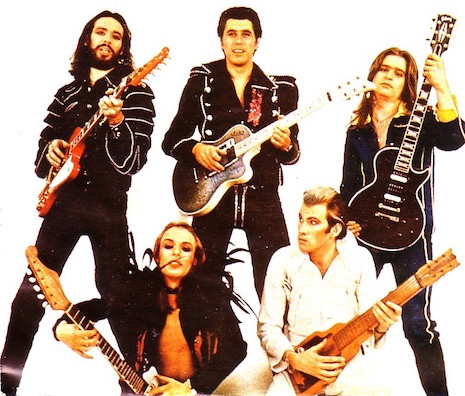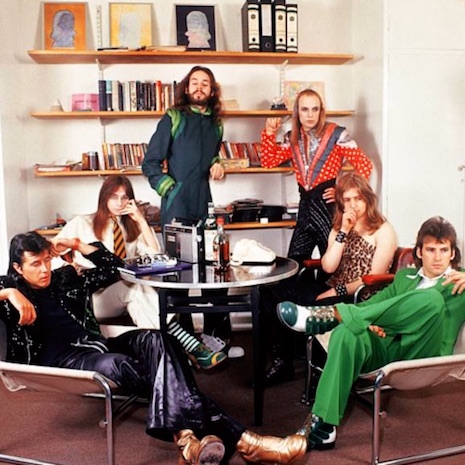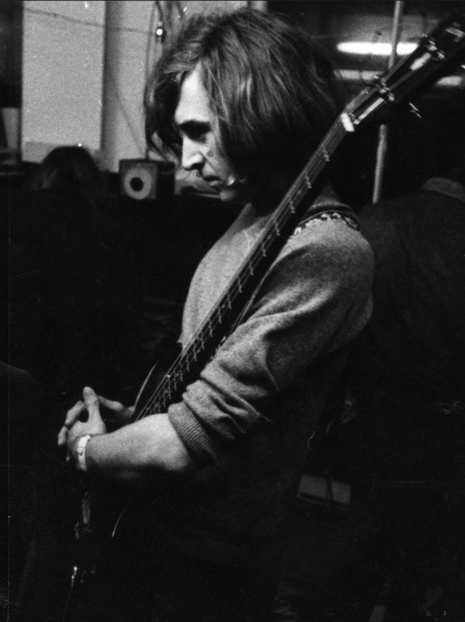
Roxy Music: Not just another guitar band.
The great Roy Wood said on some late-nite radio show that for a long time he thought Ike and Tina Turner were a cool-sounding R&B band called I Can Turn A Corner. Easy mistake. For a long time, I thought Bryan Ferry of Roxy Music was singing about “wee-wees up the walls, and mashed-potato smalls…” when he sang “weary of the waltz, and mashed-potato schmaltz” on “Do the Strand.”
That I thought Roxy Music could sing about urination as decoration or squidgy y-fronts and not consider it at all out of place in their repertoire gives but some small idea as to how radical, how shocking, how breathtakingly original Roxy Music seemed when they first landed. Their debut single was named after a packet of cigarettes (“Virginia Plain”—actually a painting of a packet of cigarettes). They sang about blow-up dolls (“In Every Dream Home a Heartache”), and a kind of Ballardian love interest contained/hidden in a car’s license plate—the CPL 593H on “Re-make/Re-model.” So why not edible undergarments? It seemed all too feasible in an era of instant mash, Angel Delight, moon landings, Teflon frying pans, group sex, safari suits, and silver hot pants.
Roxy Music sounded as if they had just beamed down from outer space and brought along the music of the spheres. In fact, they had. Roxy Music was the sound of the future—but we just didn’t realize it then. Roxy was so overwhelmingly new. No one knew what to think. The group was originally comprised of Bryan Ferry (vocals, keys, and chief songwriter), Graham Simpson (bass), Phil Manzanera (guitar), Andy Mackay (saxophone and oboe), Paul Thompson (drums and percussion), and last but not least, Brian Eno (VCS3 synthesizer, tape effects, backing vocals and “treatments”). Ferry had started the band alongside Graham Simpson. The cool suave vocalist came from a poor working class background. His grandfather had courted his grandmother on a horse and plow for ten years before getting married. Times were tough. Ferry later claimed his parents lived “vicariously” though they were always better dressed than everyone else. It was via his mother that Ferry got his introduction to rock ‘n’ roll—she took him a Bill Haley concert in the 1950s. But Ferry preferred jazz and soul and his ambition was for a career in art and possibly teaching if that didn’t work out.
This all changed after Ferry hitchhiked to London to catch an Otis Redding concert. Redding was one of the greatest soul singers/performers of all time. It was a life-changing experience. Ferry knew he had to be a singer.

Roxy model for the IKEA catalog.
Most of his life Ferry had felt out-of-step with his contemporaries. He felt like “an oddity.” It wasn’t until he started studying Fine Art under the tutelage of pop artist Richard Hamilton at Newcastle University that he found the confidence to push forward with his own ideas and believe in his own talents. Inspired by Redding and by Hamilton’s pop art aesthetic, Ferry started writing songs. He also started singing and performing. Graduating in 1968, Ferry moved to London. After a couple of false starts with the bands the Banshees and Gasboard, Ferry formed Roxy Music with Simpson in 1970. Andy MacKay and Eno soon joined, then Thompson and finally Phil Manzanera.
As Manzanera later recalled, the rich diversity of those early sessions together created Roxy sound:
“We’d start off with ‘Memphis Soul’ Stew, and then we’d go into ‘The Bob (Medley)’, this heavy bizarre thing about the Battle Of Britain with synths and sirens. We had everything in there from King Curtis to The Velvet Underground to systems music to ‘50s rock ‘n’ roll. At the time we said this was ‘50s, ‘60s, ‘70s and ‘80s rock’n'roll. Eno would respond to something that sounded like it came off the first Velvets album, then Ferry would play something ‘50s and I’d play my version of ‘50s. I was always a terrible session player. I could never learn a solo and I stuck that ‘not quite right’ approach onto Roxy. Six people in a band created this hybrid.”
More early Roxy Music, after the jump…






